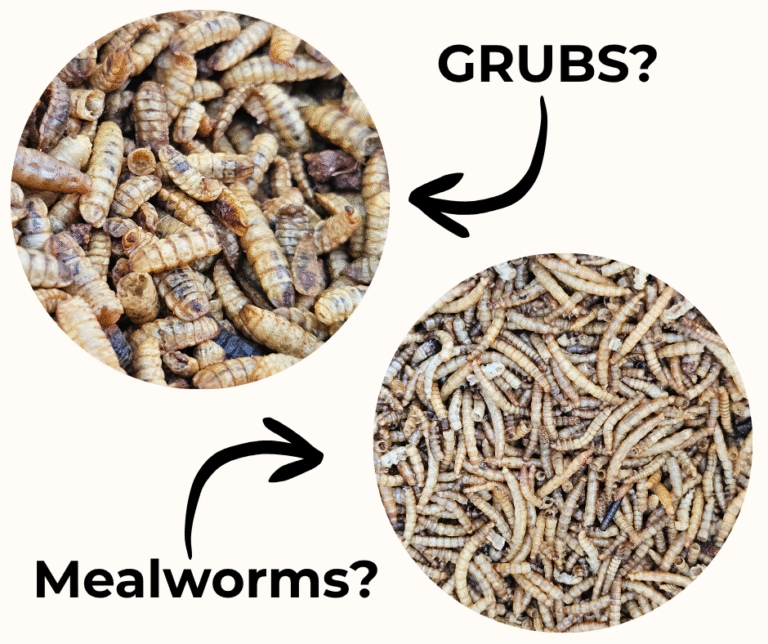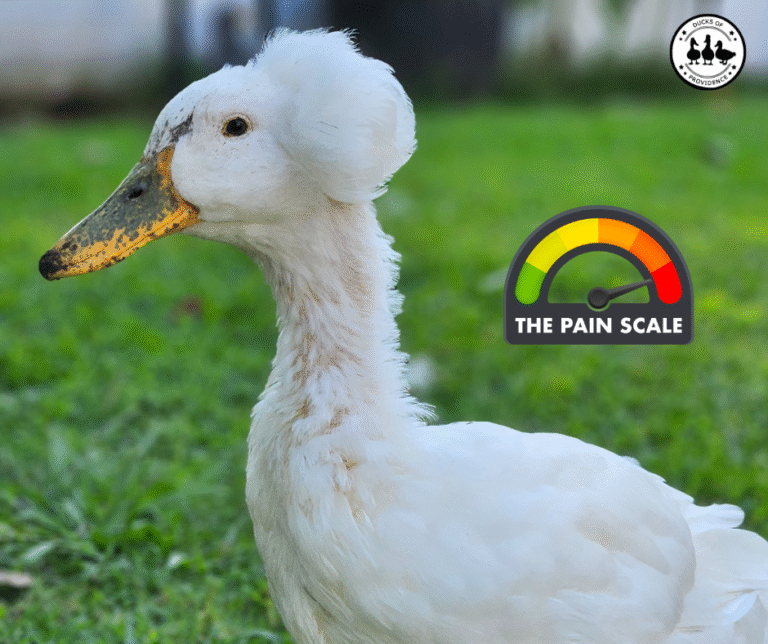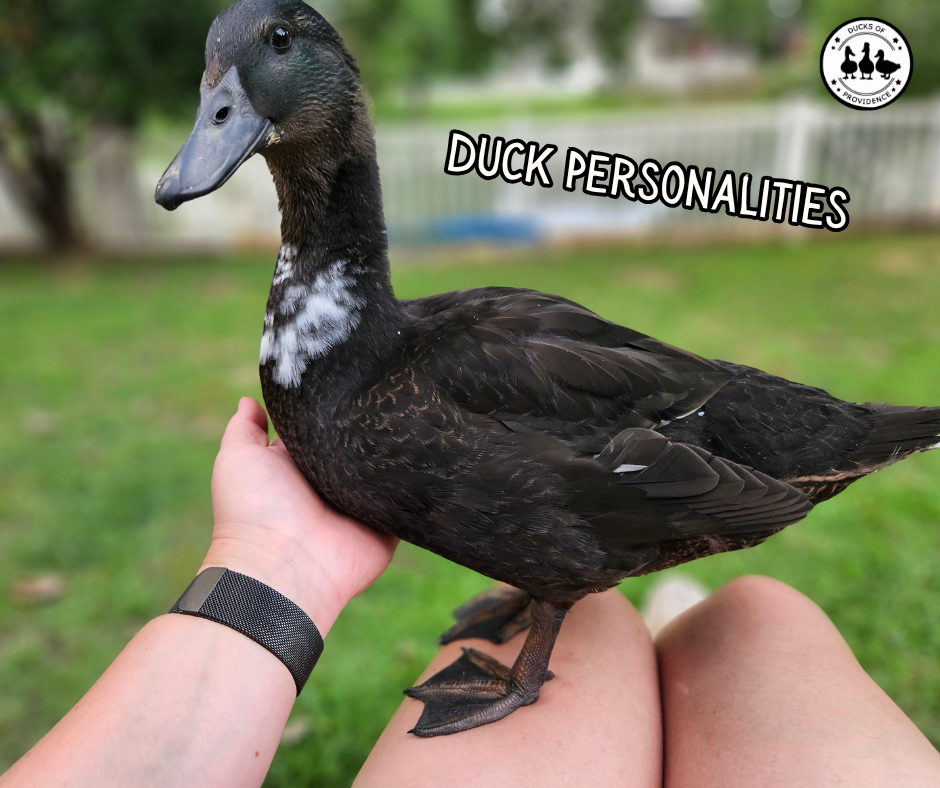
Duck Personalities – What They Reveal About Our Ducks (and Us!)
Just like people, every duck has its own personality. Some are confident leaders, others are gentle observers, and a few are curious explorers who always find trouble before anyone else does. Understanding your duck’s personality helps you build trust, strengthen your bond, and create a happier, more balanced flock.
Over time, I’ve come to know my own ducks not just by their colors or breeds, but by who they are. From Krümel’s affectionate snuggles to Simon’s bold attitude and Muffin’s endless curiosity, their distinct personalities shape every day on our little pond. In this guide, we’ll look at the most common duck personality types, how to recognize them, and how to nurture each one to bring out the best in your flock.
Ducks of Providence is free, thanks to reader support! Ads and affiliate links help us cover costs—if you shop through our links, we may earn a small commission at no extra cost to you. Thanks for helping keep our content free and our ducks happy! 🦆 Learn more
Understanding Duck Personalities
All ducks share certain instincts such as dabbling in water, preening, and foraging, but their personalities are shaped by a combination of biology, environment, and life experience. Recognizing these factors not only helps you understand their behavior but also enriches your care routines and interactions.
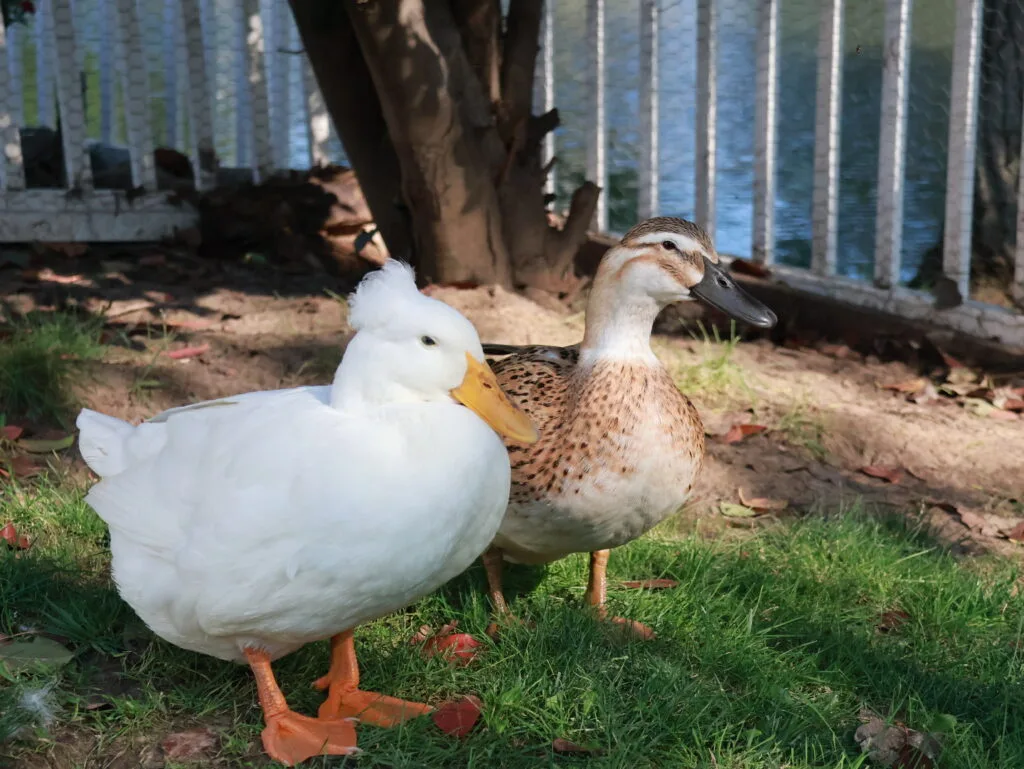
Nature and Nurture
A duck’s personality begins with its genetics. Some breeds tend to be more outgoing, calm, or talkative than others. For instance, Pekins are often friendly and social, while Call Ducks are lively and vocal. However, personality is never determined by breed alone. Upbringing and environment play major roles as well.
Ducklings that are gently handled and regularly exposed to positive human contact often grow into trusting and affectionate adults. Those who experience stress, rough handling, or limited interaction may remain cautious. Even within the same breed, individual ducks develop distinct personalities that reflect their unique experiences.
Observation Matters
Every duck expresses its personality through body language and behavior. You can learn a lot simply by watching how they move, react, and interact with others. Some ducks stride confidently into new situations, while others prefer to wait and observe. Notice small details like who leads the group, who finds a favorite spot to nap, or who comes running first when you bring snacks.
These repeated patterns tell you more about their comfort levels, confidence, and social roles within the flock. Over time, you will recognize subtle signals that reveal how each duck feels and what they need from you.
The Role of Trust and Bonding
Trust is at the center of every duck’s personality. Ducks that feel safe around you will show it through relaxed posture, soft chatter, and gentle nibbling as a sign of affection. Building trust takes patience, consistency, and respect for their space. Calm feeding times, soft talking, and gentle handling all help create a sense of security.
When ducks trust their environment and caregivers, their true personalities begin to shine. Shy ducks may become more curious, and bolder ducks may show affectionate sides that were not obvious before.
Why Understanding Personality Matters
Knowing your ducks’ personalities helps you care for them more effectively. You will understand which ducks need reassurance, which ones thrive on exploration, and which might occasionally cause a bit of chaos at feeding time. When you adjust routines and housing to fit their individual needs, your flock becomes more peaceful and balanced.
Understanding your ducks’ personalities is not only practical but also deeply rewarding. It allows you to see each one as an individual with thoughts, feelings, and preferences, and that is one of the greatest joys of sharing life with ducks.
Common Duck Personality Types
Every flock has its own balance of personalities. Some ducks are bold and curious, others are calm and nurturing, and a few seem born to make everyone laugh. Understanding who fits which role helps you interpret their behavior and keep harmony in your little community.

Here are some of the most common duck personalities, along with a few stories from our own flock here at Ducks of Providence.
The Leader
The leader sets the pace for the flock. This duck makes decisions, keeps everyone together, and often stands at the front when exploring new territory. A true leader earns respect not through dominance, but through quiet confidence and awareness.
Hertha was our true leader. She guided the flock with calm authority and an unspoken sense of order. The others naturally followed her lead, and even after her passing, that leadership spirit still echoes in our flock.
The Protector
Protectors often take on the role of watchful guardians. They are not necessarily the leaders, but they stand ready to defend, guide, and look after the others. Protectors are usually alert and observant, often positioning themselves between potential danger and their flockmates.
Simon is our protector. He keeps a close eye on his girls, gives them first access to food, and stands watch while they bathe or rest. When hormones surge, he can also become a bit of a bully, reminding us that protective instincts and assertive behavior often go hand in hand.
The Gentle Soul
Gentle souls are calm, patient, and nurturing. They rarely engage in conflict and often comfort others. These ducks bring balance and peace to the flock.
Penny is a gentle soul. She moves through the day with quiet kindness, never causing trouble, and always keeping a sense of calm around her.
The Curious Explorer
Curious explorers love to investigate anything new. They are the first to check out a new pool, try a different snack, or peek inside a freshly opened crate. These ducks bring energy and discovery to daily life.
Muffin fits this personality perfectly. She is small but fearless, always exploring every corner and often inspiring the others to follow her lead.
The Comedian
The comedian keeps life light. These ducks are playful, expressive, and endlessly entertaining. They chatter, splash, or find new ways to make you smile.
Emma and Schnatterinchen share this role. Emma can be a bit of a bully at times, but she has a funny, spirited side that makes her hard to stay mad at. Schnatterinchen has a similar sense of humor but balances it with friendliness, often socializing with everyone and diffusing tension when needed.
The Shy Observer
Observers prefer peace and predictability. They are not timid, just more selective about when to engage. They like routine and close companionship with ducks they trust.
Ronja is our shy observer. She quietly watches everything unfold, joins in when she feels comfortable, and notices every change in her surroundings.
The Social Butterfly
These ducks are outgoing and affectionate. They enjoy both duck and human company and are usually the first to greet you at the gate. Their presence brings a sense of openness to the flock.
Penny also has this social side. She blends gentleness with approachability, making her one of the easiest ducks for both humans and flockmates to get along with.
The Snuggle Bug
Snuggle bugs are affectionate and deeply bonded with their caregivers or a favorite flockmate. They seek closeness and physical comfort, often resting beside you or following you around.
Krümel is our snuggle bug. She loves company, gentle head rubs, and quiet time together. Her affection is sincere and grounding.
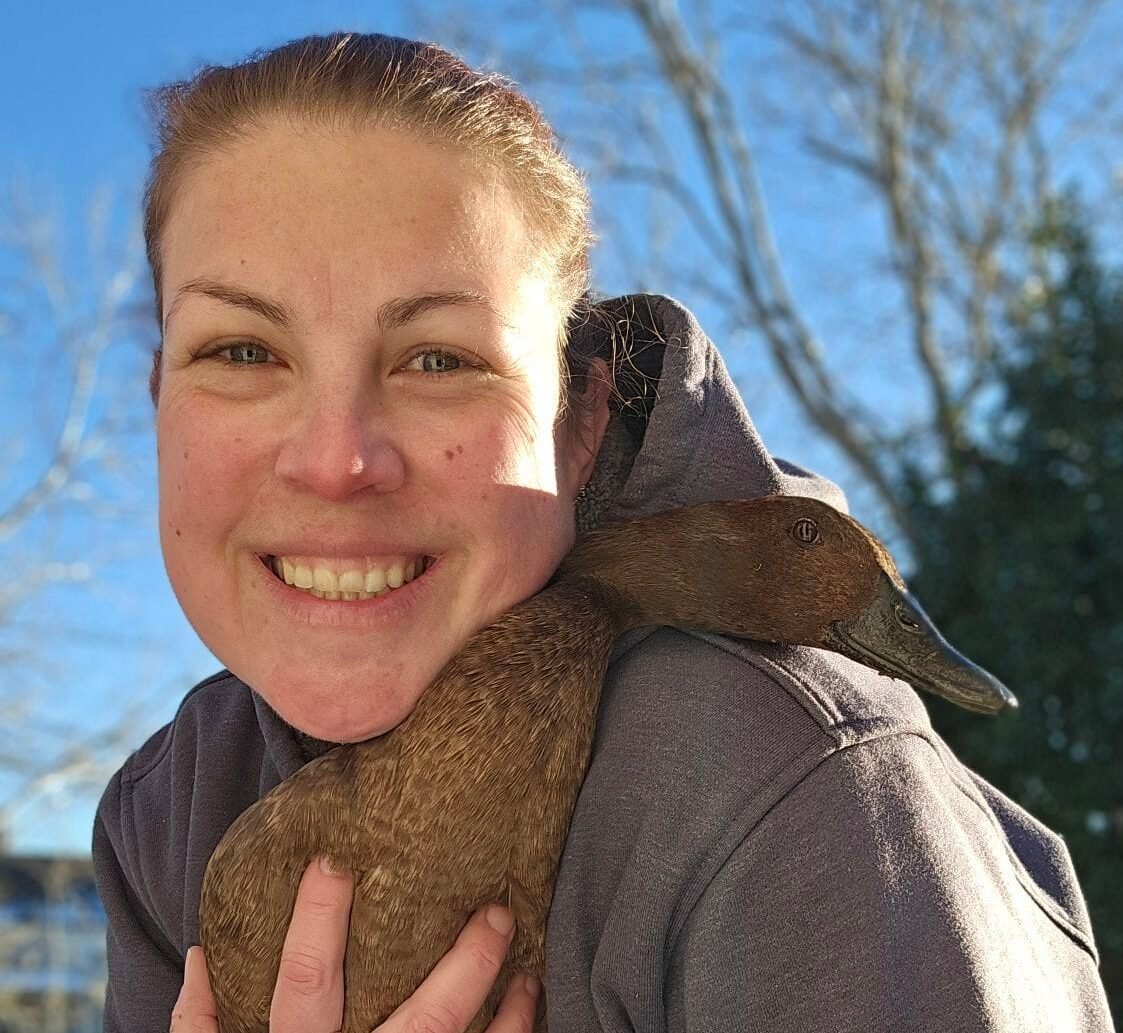
The Friendly One
Friendly ducks are easygoing, adaptable, and kind. They often bridge gaps between personalities and keep the flock feeling cohesive.
Schnatterinchen perfectly embodies this type. She is social with other ducks, playful but not pushy, and her friendliness makes her a favorite among both ducks and people.
The Troublemaker
Every flock has a troublemaker, the duck who tests every rule and somehow makes mischief look endearing. Troublemakers are curious, clever, and often one step ahead of you. They tip over water bowls, sneak into spots they shouldn’t, or steal snacks when you’re not looking.
Emma definitely has a streak of this personality. Her boldness often leads to small adventures that make us laugh later, even if they cause a bit of extra cleaning in the moment.
Each duck adds something unique to the flock, and together they create a rich, dynamic community. By understanding who fills which role, you can better anticipate flock interactions, manage tension, and nurture stronger bonds between your ducks and yourself.
How to Identify Your Duck’s Personality
Getting to know your ducks on a personal level takes time, patience, and daily observation. Personalities are not always obvious at first, especially in ducklings or new flock members. Over time, consistent behavior patterns reveal who is bold, who is shy, and who loves to be the center of attention.
Recognizing these traits helps you understand your ducks’ emotional needs, anticipate flock dynamics, and build stronger bonds with them. Here are some ways to identify and interpret your ducks’ personalities.
Watch Their Body Language
A duck’s posture, head movements, and feather position can reveal a great deal about temperament.
- Confident ducks stand tall with their necks stretched out and are often the first to explore or lead the group.
- Gentle or submissive ducks keep a lower stance and move slowly, rarely challenging others.
- Shy ducks may stay at the edge of the group, occasionally peeking around others for reassurance before stepping forward.
- Ducks that puff up, chase, or stretch their wings wide are usually asserting dominance.
By watching how each duck carries itself and moves within the group, you begin to see who naturally leads, who follows, and who prefers quiet independence.
Observe Feeding Time
Feeding time offers one of the clearest opportunities to understand flock behavior. Pay attention to who eats first, who waits, and who tries to take over the bowl.
Leaders and assertive ducks usually step forward first and claim their favorite spot.
Protectors often stand near the food, making sure others can eat before taking their turn.
Gentle souls and shy ducks might wait until the excitement settles before eating.
In our flock, Simon stands guard while his girls eat, keeping a close watch over everyone. Muffin, ever curious, likes to take a few bites while exploring everything else around her.
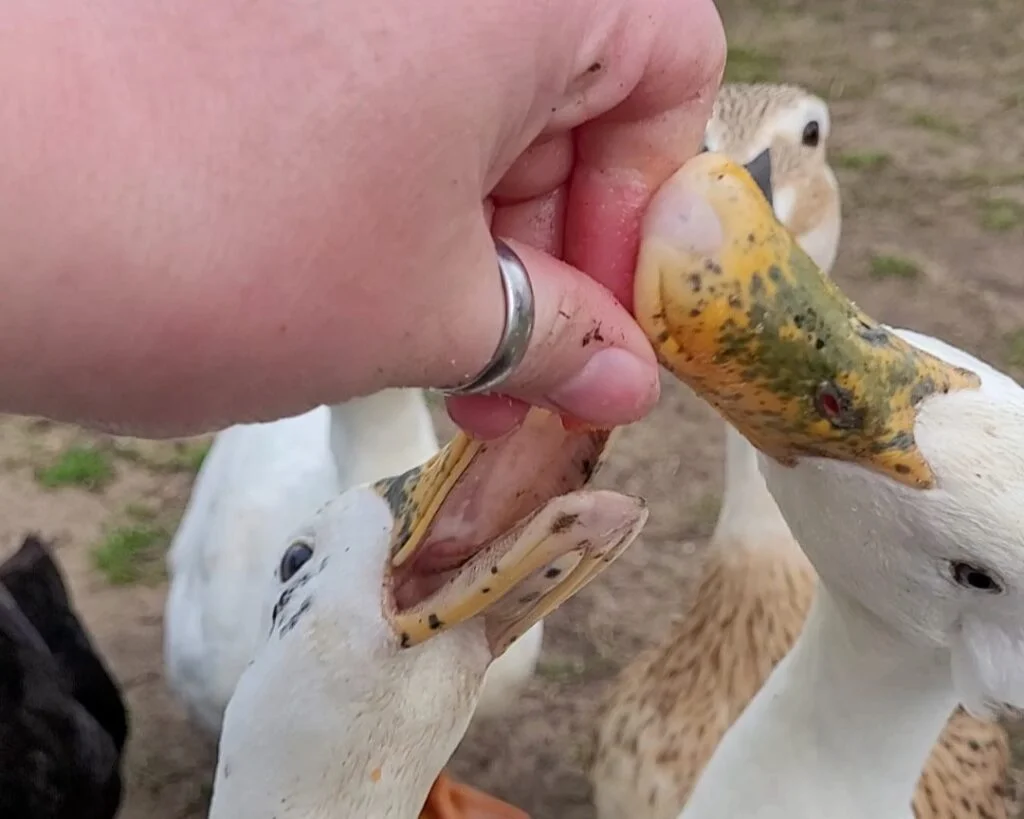
Notice Social Interactions
Social behavior reveals how ducks relate to one another and to you. Ducks that enjoy companionship tend to preen near each other, chatter softly, or rest side by side. Some form strong bonds with one partner, while others move easily between friends.
- Friendly ducks share space comfortably and avoid conflict.
- Comedians are playful and bring energy to the group.
- Shy observers stay slightly apart but remain aware of everything happening around them.
Pay attention to who initiates contact and who follows. These patterns help you understand the flock’s hierarchy and emotional connections.
Pay Attention to Reactions in New Situations
How ducks respond to change can reveal confidence levels and curiosity.
- Explorers and troublemakers are usually first to investigate new things, eager to see what is happening.
- Leaders approach carefully but with purpose, showing others when it is safe.
- Shy or cautious ducks hang back until they see that the situation is safe.
If you introduce a new pool, toy, or treat, watch who reacts first. Those initial responses often reflect long-term personality traits.
Listen to Vocalizations
Ducks communicate emotion and intent through sound. Their voices can express excitement, comfort, or curiosity.
- Social and outgoing ducks tend to chatter constantly, especially when they see you coming.
- Quiet ducks rely more on subtle body language.
- Some ducks develop unique sounds that you will learn to recognize over time, especially when they are happy or seeking attention.
Emma, for example, has a distinct and lively voice that is impossible to miss. Penny’s softer chatter, on the other hand, creates a sense of calm and warmth.
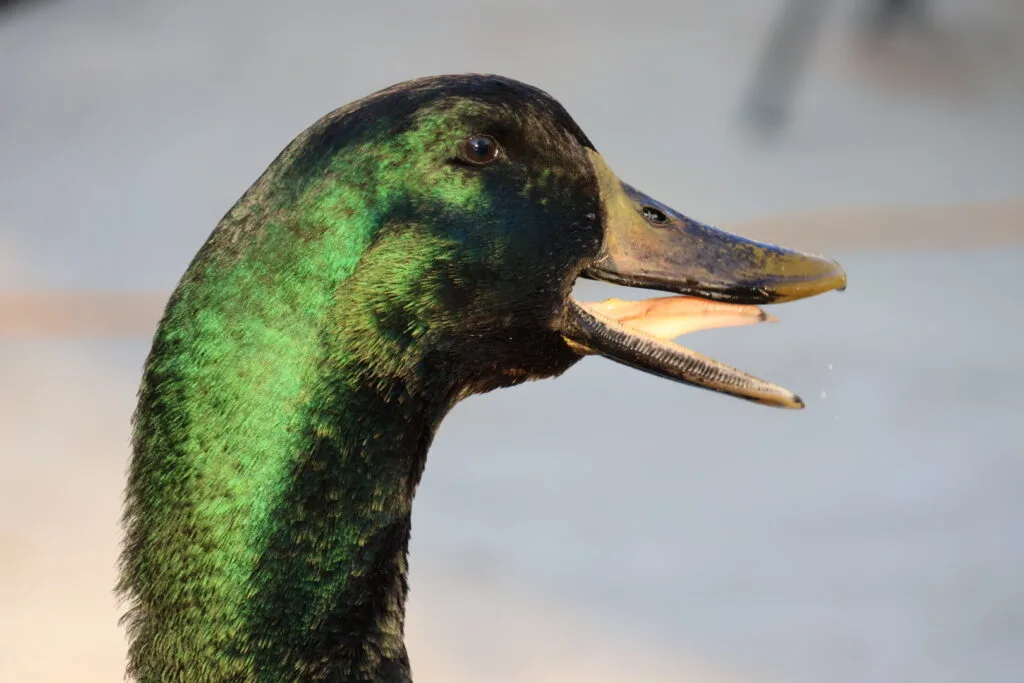
Track Changes Over Time
Personality is not fixed. It can evolve with age, health, hormones, and flock changes. A duck that was once shy may become confident after forming a bond with a new companion. Others may become more assertive during breeding season when protective instincts are stronger.
Spending time with your ducks every day helps you notice these gradual shifts. Understanding them allows you to adjust routines, manage interactions, and keep your flock content.
Use Observation as Enrichment
Observation is one of the most rewarding parts of duck keeping. It turns ordinary moments into opportunities to connect. As you learn each duck’s habits and preferences, you begin to anticipate their moods and choices. You will soon recognize who is about to start a splashy water game or a playful chase before it even happens.
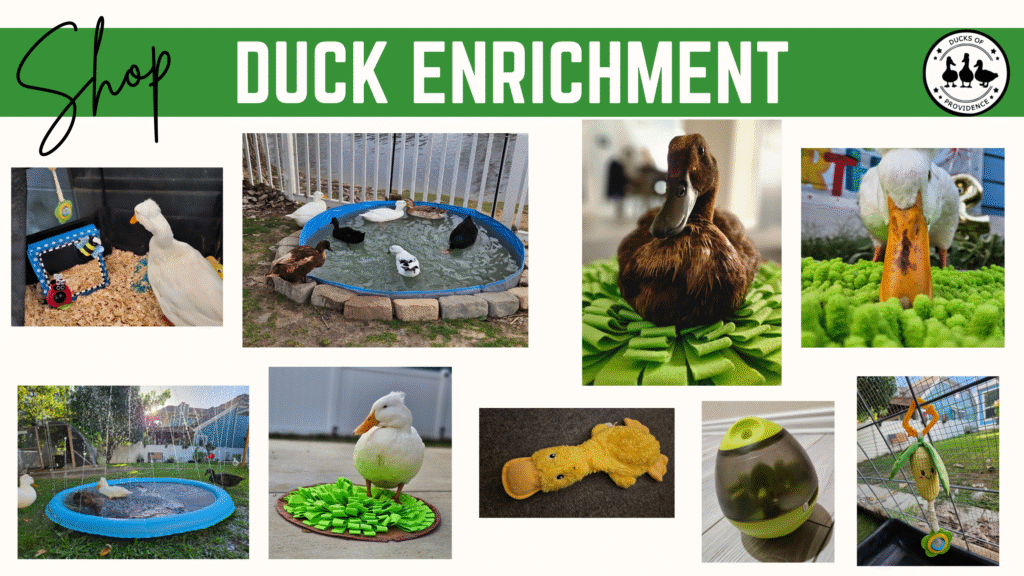
Learning to identify your ducks’ personalities transforms duck keeping into something deeper and more meaningful. Each observation strengthens your connection and helps you see your flock not as a group of birds but as individuals with their own thoughts, emotions, and charm.
Flock Dynamics and Compatibility
A flock of ducks is more than a group of birds living together. It is a small community where personalities, relationships, and roles shape daily life. Understanding how these personalities interact helps you keep peace and balance among your ducks. Some will lead, others will follow, and many will find their place somewhere in between.
How Ducks Establish Order
Ducks naturally organize themselves into a social structure that keeps the group functioning smoothly. This order is based on experience, confidence, and temperament. Leaders usually emerge through quiet persistence rather than aggression. Gentle and friendly ducks form the foundation of stability, while shy or submissive ducks maintain peace by avoiding conflict.
A balanced flock has a mix of personalities that complement one another. When the flock understands its structure, everyone knows where they belong, which reduces stress and tension.
When Personalities Clash
Even in the calmest flocks, disagreements happen. Ducks may chase, peck, or block others from food or water. This is normal behavior as they reinforce their social hierarchy, especially when hormones rise or new ducks are introduced.
Pay attention to whether the behavior is temporary or persistent. Brief displays of dominance are natural, but ongoing aggression may indicate that one duck feels threatened or frustrated. Providing enough space, several feeding and watering stations, and visual barriers helps prevent conflicts from escalating.
In our flock, Emma sometimes asserts her dominance, especially during feeding or nesting times. Simon steps in as a watchful protector, which helps calm the situation and keep the peace.
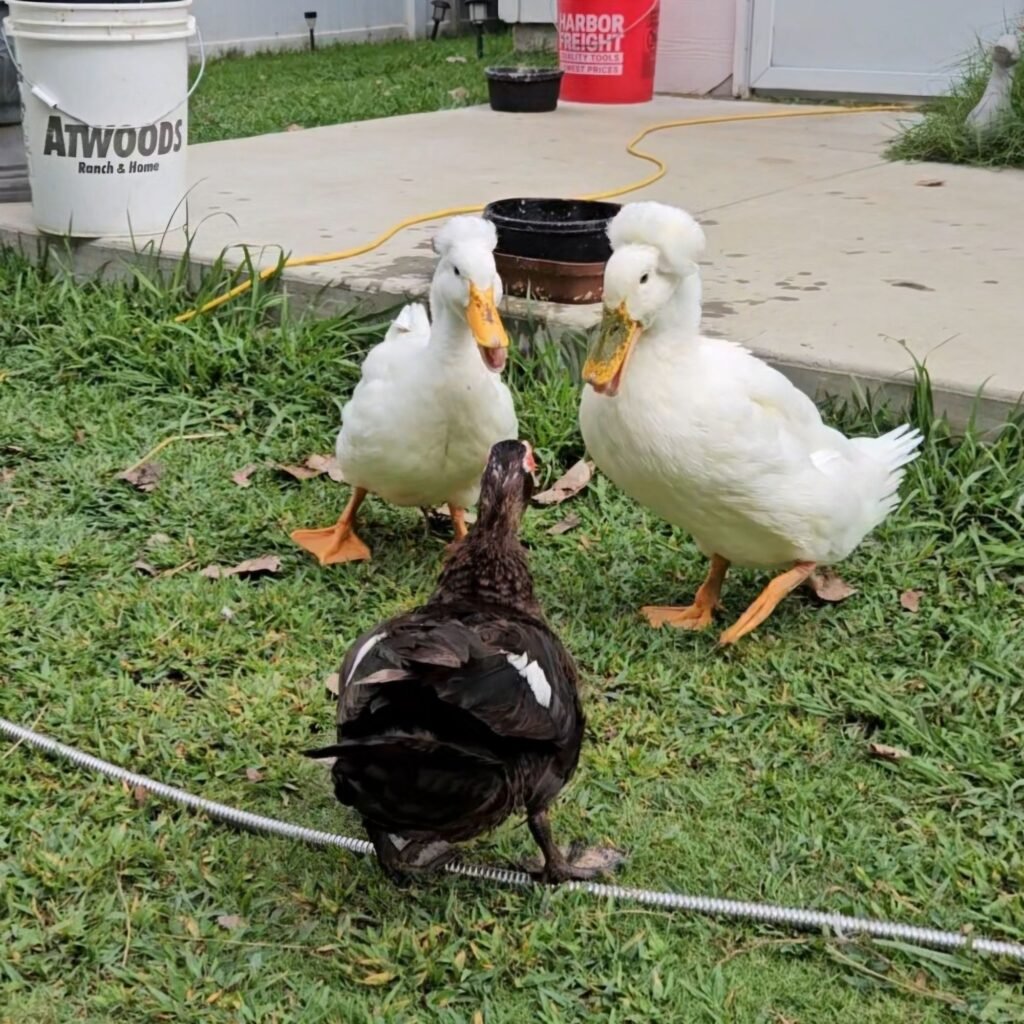
Recognizing Signs of Harmony
When a flock is balanced, you will notice relaxed postures, synchronized preening, and shared resting spots. Ducks that get along well will often nap side by side, bathe together, and communicate through soft chatter. There is a quiet rhythm to their day that signals comfort and security.
Penny and Schnatterinchen are wonderful examples of how friendliness and calm energy create harmony. They move easily between the others and seem to bring balance wherever they go.
Supporting a Peaceful Flock
You can help your ducks maintain positive relationships through thoughtful management. Give them plenty of space to forage and explore. Provide more than one pool or feeding area so no one feels excluded. Enrichment items like mirrors, floating greens, or safe logs to climb on give assertive ducks something to focus on besides their flockmates.
Spend time observing your ducks at different times of day. You will begin to recognize small patterns, such as who prefers the shade, who guards the pool, and who always initiates bath time. These details reveal how your flock works together as a unit.
Adapting to Change
Flock dynamics can shift when new ducks arrive, during breeding season, or after the loss of a member. Leaders may change, alliances can form, and some ducks may temporarily act out while adjusting. Patience and consistency are essential during these times.
When Hertha passed, the balance within our flock changed noticeably. Simon became more protective, while the others slowly reestablished their routines. Watching them adapt reminded me how strong and sensitive ducks can be.
Understanding flock dynamics allows you to create an environment where every duck feels safe and valued. A balanced flock is not one without differences but one where every personality contributes to the group in its own way. With attention and care, harmony naturally follows.
Nurturing Different Personalities
Every duck has its own personality, and each one benefits from care that suits who they are. Some ducks thrive on attention and interaction, while others prefer quiet consistency. Recognizing these differences allows you to create an environment where every duck feels safe, confident, and content.
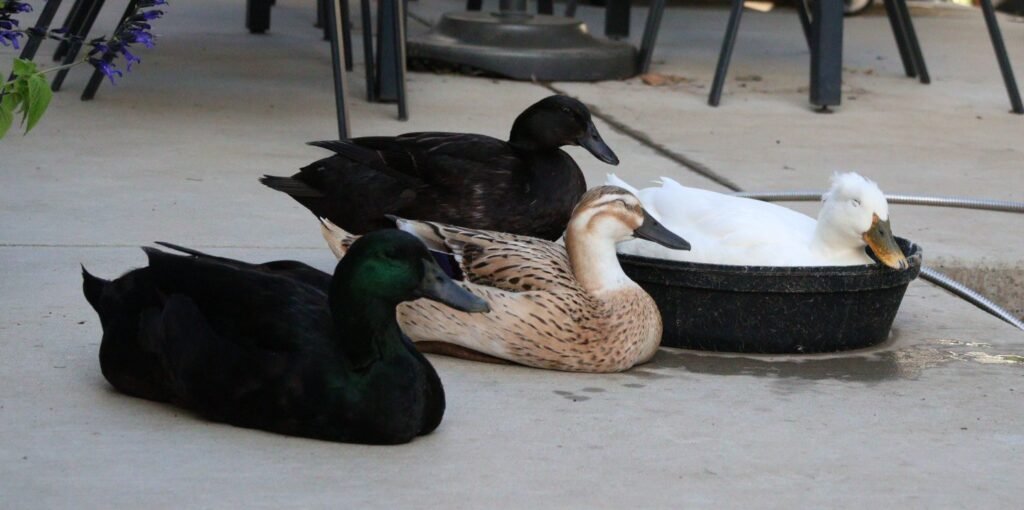
Create a Calm and Predictable Routine
Ducks feel most secure when life follows a steady rhythm. A consistent schedule for feeding, cleaning, and free time helps reduce anxiety, especially for shy or cautious ducks. When ducks know what to expect, they spend less time feeling alert and more time enjoying their surroundings.
If you notice a duck reacting nervously to sudden changes, try making adjustments gradually. Small, consistent steps are often more successful than major changes all at once.
Provide Space for Individual Needs
A well-designed duck area allows each duck to express its personality comfortably. Bold and active ducks appreciate room to explore and test new things, while gentle or quiet ducks need peaceful corners where they can rest undisturbed.
Multiple pools, shaded spots, and separate feeding stations make it easier for everyone to enjoy their favorite activities without competition.
In our flock, Krümel and Muffin love exploring every inch of the run and pond, while Emma prefers calm spaces where she can relax or nap beside me. Both approaches are perfectly normal.
Encourage Positive Behavior
Just like people, ducks respond to reinforcement and environment. When a duck behaves calmly or interacts well with others, reward it with soft words, treats, or extra time in a favorite spot. This helps strengthen good habits and confidence.
If one duck becomes too assertive, distraction and redirection work better than scolding. Offering enrichment toys, foraging treats, or supervised outdoor time can help release energy in a healthy way.
Balance Interaction and Independence
Some ducks enjoy human companionship, while others are happiest with minimal handling. Learning how each duck prefers to interact helps you build trust on their terms.
Snuggle bugs like Krümel appreciate gentle contact and attention, while shy observers such as Ronja prefer to stay near without being touched. Allowing them to choose how close they want to be builds confidence and mutual respect.
Support Ducks During Hormonal or Seasonal Changes
Hormonal shifts can temporarily alter behavior. A calm and steady approach is especially helpful during these times. Giving your ducks space and avoiding unnecessary stress can prevent conflicts within the flock. Ducks that show temporary aggression or guarding behavior usually return to their normal personalities once the hormonal cycle settles.
Simon, for example, becomes more protective during spring. We let him express this naturally while keeping routines stable so that harmony in the flock returns quickly afterward.
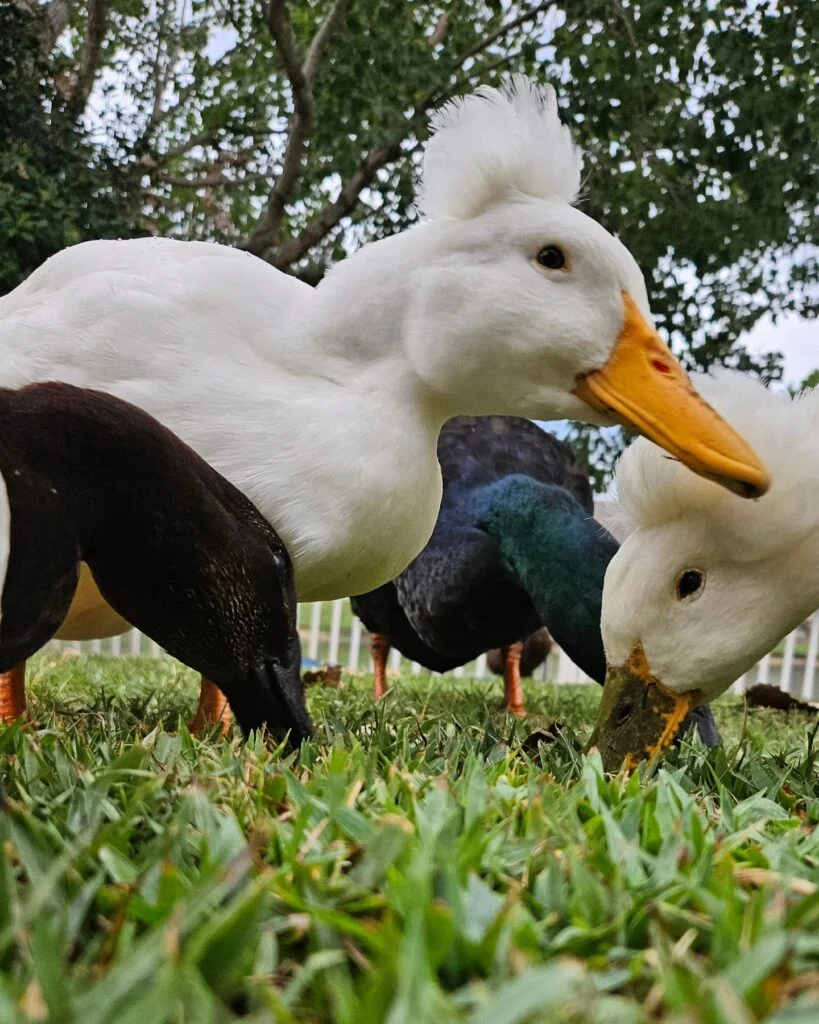
Celebrate Their Differences
Every personality adds something valuable to the group. Leaders bring structure, explorers spark curiosity, comedians add joy, and gentle souls bring peace. Accepting and celebrating these differences creates a richer, happier flock dynamic.
Spending time with your ducks every day helps you appreciate these small distinctions even more. Over time, you will know who prefers what type of treat, who needs encouragement to swim, and who loves to waddle straight to you for a chat.
Nurturing different personalities is about meeting each duck where they are and helping them thrive in their own way. When you understand what makes each one unique, you build trust and a connection that lasts a lifetime.
Our Flock: Stories from the Pond
Every day with our ducks reminds me that personalities are as unique as the feathers they wear. Over time, their traits have become unmistakable, and together they form a flock full of humor, care, and connection. Here is a glimpse into our daily life and the roles each of our ducks plays in it.
Hertha – The Leader
Hertha was our original leader, steady and composed, with a calm strength that guided the others naturally. She never demanded attention but earned it through quiet confidence. When the flock moved, she was always at the front. Her presence brought peace and order, and even now, her influence can still be felt. She taught the others, and us, what true leadership looks like.
Simon – The Protector
Simon has a gentle heart wrapped in a strong personality. He watches over his girls with care, giving them first choice at the food and standing nearby as they bathe. He takes his role seriously, scanning the surroundings for anything unusual. During spring, his protective instincts sometimes make him a bit pushy, but beneath it all he is deeply loyal and always ready to keep the flock safe.
Emma – The Comedian and Troublemaker
Emma is our mix of mischief and laughter. She loves attention and never misses a chance to make a splash, both literally and figuratively. She can be a bit of a bully, especially toward the more timid ducks, but her charm and humor always shine through. Her curiosity often leads her into situations that keep us on our toes, and she never fails to make us smile.
Schnatterinchen – The Friendly One
Schnatterinchen is one of the easiest ducks to love. She is social and approachable, often mingling freely with everyone. Her soft chatter fills the yard and seems to bring the flock together. She has a funny, playful side, but her friendliness and calm energy make her the glue that keeps the group connected.
Penny – The Gentle Soul
Penny has a peaceful spirit. She moves gracefully through the day, never hurried or demanding. She enjoys the company of others but never seeks the spotlight. Penny’s calmness has a quiet influence on the rest of the flock, especially during busy or noisy moments. She reminds us of the comfort that comes from simply being present.
Ronja – The Shy Observer
Ronja likes her space and takes her time before joining in. She stays close enough to watch everything but only engages when she feels comfortable. Her calm and thoughtful nature balances the more excitable ducks and brings a sense of steadiness to the flock. When she chooses to be close, it feels like a genuine sign of trust.
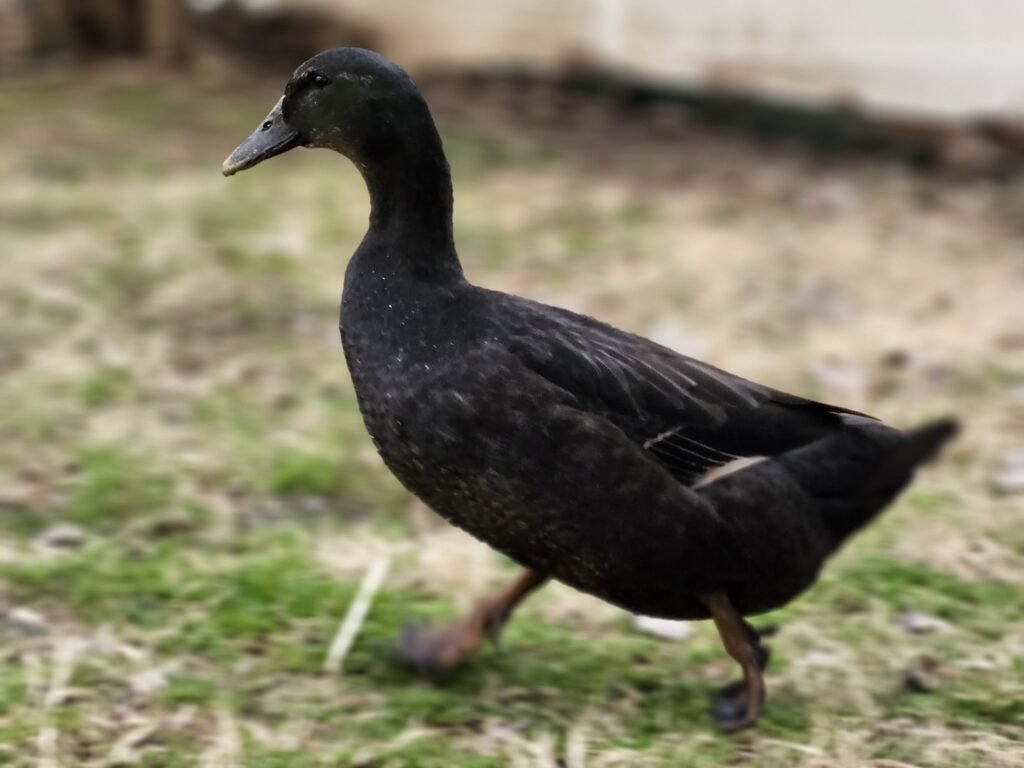
Krümel – The Snuggle Bug
Krümel is affectionate and loyal, happiest when she can sit near us or rest her head in a familiar hand. She loves calm moments, quiet talk, and gentle company. Her bond with us runs deep, and her warmth brings comfort on even the busiest days. She is proof that ducks are capable of true connection and emotion.
Muffin – The Curious Explorer
Muffin may be small, but her personality is huge. She is always the first to check out something new and often the one who finds creative ways to surprise us. Her curiosity leads her into tiny spaces and unexpected adventures, and she approaches every discovery with enthusiasm. Muffin’s energy brings life to every corner of the yard.
Each of our ducks has a story that adds to the rhythm of our days. Together they form a flock that is full of movement, sound, and personality. Watching them interact, care for one another, and express themselves reminds me daily that ducks are far more than pets. They are individuals with hearts, habits, and friendships that make them part of the family.

Fun Facts About Duck Behavior
The more time you spend observing ducks, the more you realize how intelligent and emotionally aware they are. Their daily habits, interactions, and communication are full of meaning. Here are a few fascinating facts about duck behavior that help explain some of the personalities we see in our flocks.
Ducks Recognize Faces
Studies have shown that ducks can recognize individual faces, both human and duck. This explains why your ducks may react differently when you approach compared to a stranger. Familiar voices, scents, and movements help them distinguish friend from potential threat, strengthening their trust and bond with you.
They Communicate Through More Than Quacks
While quacking is their most recognizable sound, ducks also use soft grunts, murmurs, and whistles to share information. Each tone carries meaning, from excitement and comfort to mild frustration or alarm. Over time, you learn to recognize your ducks’ unique “voices” and even anticipate their moods through sound alone.
Personality Influences Preening and Resting Habits
Confident ducks often preen openly in the middle of the group, showing they feel safe and secure. Shy or cautious ducks usually choose quieter corners or partially sheltered spots to rest and groom. Preening together also strengthens social bonds and helps maintain harmony within the flock.
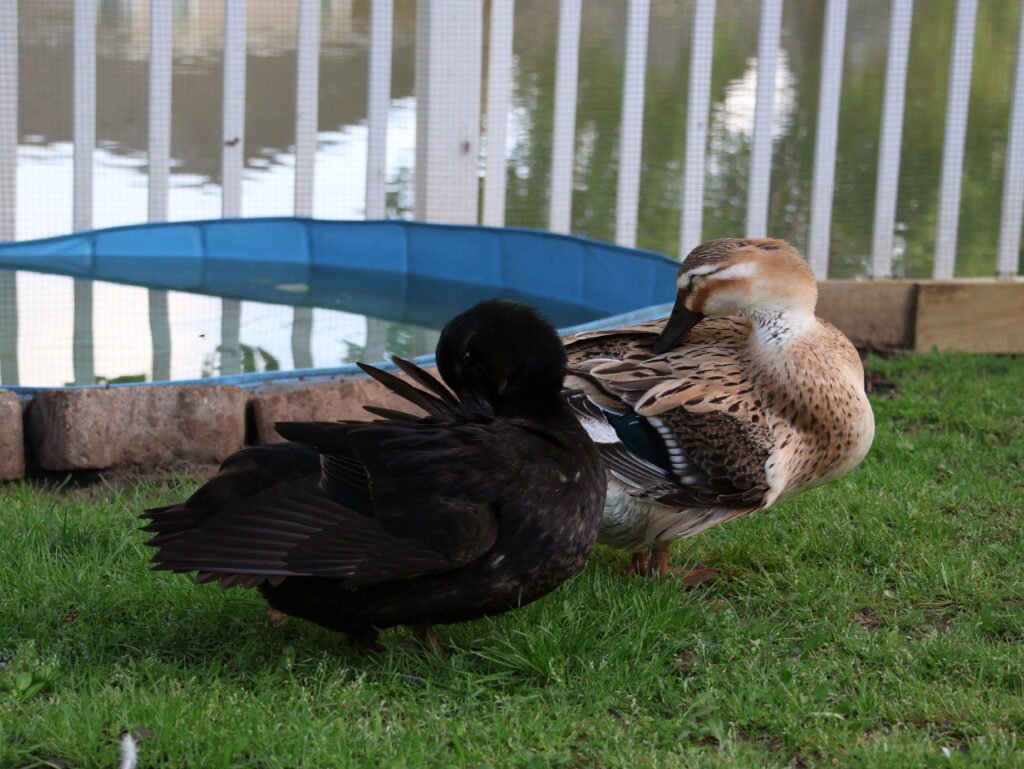
Flock Order Matters
Within every group, ducks naturally develop a social hierarchy often referred to as the pecking order. This structure reduces conflict by helping each duck know its role. Changes in flock composition, such as adding a new member, can temporarily disrupt this balance until everyone settles into their place again.
Ducks Experience Emotional Responses
Ducks are capable of showing happiness, curiosity, anxiety, and affection. They form attachments, mourn losses, and express excitement when reunited with familiar friends. These emotions are reflected in their posture, vocal tone, and eye movements, allowing attentive duck keepers to sense how their birds are feeling.
They Use Their Eyes Independently
A duck’s eyes can focus separately, allowing them to scan for predators while foraging. This split vision helps explain why ducks seem both alert and relaxed at the same time. It also means they process a surprising amount of visual information, which contributes to their cautious yet curious nature.
Bathing Strengthens Social Bonds
Bathing is not only about keeping feathers clean. Ducks often bathe together in synchronized movements, splashing and preening side by side. These moments reinforce companionship and reflect trust within the group. It is one of the many small ways ducks express connection and cooperation.
Every small behavior tells a story about how ducks think, feel, and communicate. Watching them through this lens turns daily care into discovery. Understanding the science behind their behavior helps explain why their personalities are so vivid and distinct, and it deepens the appreciation for just how special these birds are.
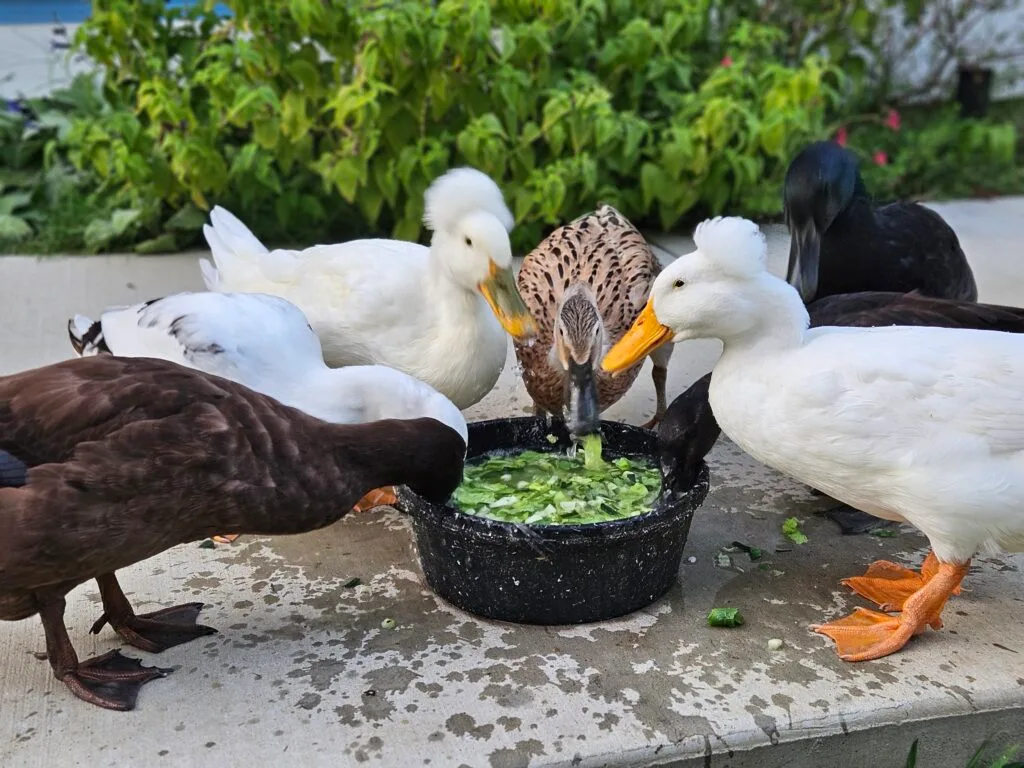
Final Thoughts
Living with ducks means sharing your days with a community of unique personalities. Each duck brings something different to the flock. Confidence, humor, curiosity, gentleness, or quiet strength. Together, they create a rhythm of life that is both calming and full of surprises.
Understanding your ducks’ personalities changes how you see them. You begin to recognize small habits that reflect who they are: the way Krümel leans in for affection, the way Muffin explores every new corner, or the way Simon quietly watches over everyone. These details reveal not just behavior but emotion and intelligence.
Taking time to observe and appreciate your ducks deepens your bond with them. It turns daily care into moments of connection and reminds you that they trust you as part of their world. They depend on you for food and safety, but they also offer companionship, joy, and an endless source of wonder.
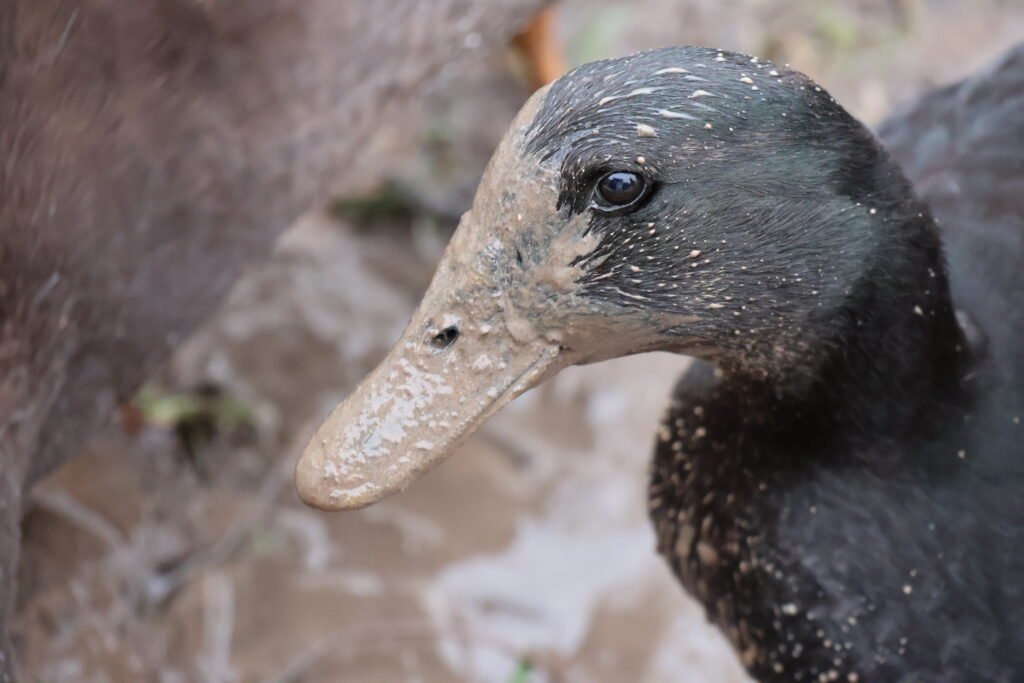
Every flock has its own balance of personalities, and that diversity is what makes duck keeping so rewarding. Whether your ducks are bold or shy, playful or peaceful, they all deserve to be seen for who they are. When you understand and nurture their individual traits, you create an environment where they can thrive, and in return, they give you more than you could ever expect from such small, feathered friends.


